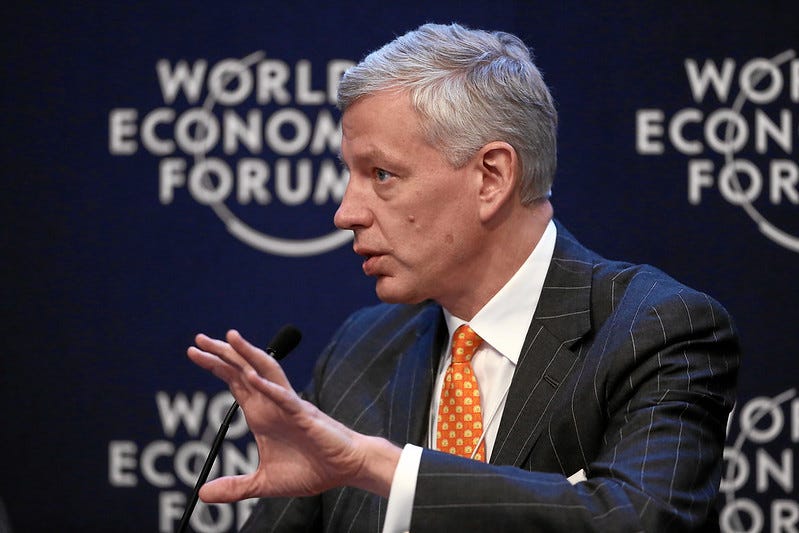Federal McKinsey contracts are a symptom of neoliberal decay
Auditor General Karen Hogan released a report on whether the Canadian government is getting value from its contracts with the U.S.-based global consulting giant, eliding deeper questions.

Overshadowed by the latest hysteria over foreign interference in Canadian elections is a new report from Auditor General Karen Hogan, who found the federal government to be violating its own procurement policies in outsourcing services to McKinsey & Co.
That would be the same McKinsey & Co which employed Dominic Barton as its global managing director from 2009 to his appointment as ambassador to China in 2019, in which he secured the release of our precious Michaels—one of whom alleges the other was a spy—from Chinese captivity.
In 2016 and 2017, Barton lived a double life as both McKinsey’s global managing director and a member of former finance minister Bill Morneau’s economic advisory panel, raising reasonable inferences about a conflict of interest.
Hogan’s report, released on June 4, examined contracts awarded to McKinsey from January 2011 to September 2023, a 12-year period in which 10 federal ministries and 10 Crown corporations awarded a total of 97 “professional services” contracts to the global consulting firm.
These contracts were worth a combined $209 million, of which $200 million was actually spent.
The AG was dispatched to determine to what extent the McKinsey contracts were awarded in accordance with existing procurement rules and whether the government is getting value for them.
This limited scope elides far deeper examination of why the government is so keen to award private sector contracts to deliver public services, and what it says about the role of the state under neoliberalism.
Hogan found that “organizations awarding the contracts showed a frequent disregard for federal contracting and procurement policies and guidance.”
Less than a third of these contracts, the AG found, were awarded through a competitive bidding process.
Of 28 competitive bids, six had criteria that appeared to be designed specifically with McKinsey in mind.
Another 10 of the 28 competitive bids contained insufficient documentation to justify awarding them to McKinsey.
This leaves just 12 contracts out of 97 being awarded through a transparent, open bidding process.
Hogan found that in four cases, an open bid enabled McKinsey to obtain additional sole-source contracts for “continuous or related work.”
This part, she said, suggests “an overreliance on that supplier,” in which the government could have found better deals for the same services with another contractor.
Out of a sample of 33 contracts Hogan’s office selected for detailed examination, 19 were sole source, with the government providing a rationale for its uncompetitive process for just one.
Of the $200 million spent on McKinsey contracts over the past dozen years, almost $160 million was spent by just three government agencies and three Crown corporations.
The departments most reliant on McKinsey from 2011 to 2023 were National Defence, Public Services and Procurement Canada (PSPC) and Immigration, Refugees and Citizenship Canada (IRCC), Hogan found.
Defence awarded 15 contracts to McKinsey worth a combined $26 million, of which just two were the result of open bidding.
PSPC paid McKinsey $26 million for three contracts, just one of which was the product of a competitive bid.
IRCC awarded two contracts to McKinsey worth $25 million total, both of which were done after a competitive bidding process.
The worst offending Crown corporations were the Trans Mountain Corporation, Canada Post and the Business Development Bank of Canada (BDBC).
Trans Mountain, the over-budget, planet-killing pipeline opening this year (thank you, Rachel Notley) to almost triple the amount of tar sands crude available for export, paid McKinsey nearly $34 million for a single sole-source contract in October 2022.
Canada Post purchased 14 contracts from McKinsey for $26.6 million, of which five came through a competitive process.
BDBC gave McKinsey 11 contracts worth $22 million, five of which were done through open procurement. In one case, McKinsey was awarded a contract despite not offering the government the best procurement price. The government didn’t explain why.
While the AG report examined a period spanning Stephen Harper’s Conservative government and Prime Minister Justin Trudeau’s Liberal government, Hogan told a parliamentary committee that Harper’s government spent $8.6 million on McKinsey contracts, meaning 96% of the funds were spent by the Liberals since 2015.
But, Hogan added, the Conservative contracts were plagued by the same flouting of rules as the Liberal contracts.
"We saw non compliance, either with procurement rules or difficulty demonstrating value for money, throughout the whole 12-year period of time and it was in almost all organizations," the AG said.
The Liberals’ increasing generosity towards McKinsey came amid the federal government’s growing reliance on professional services contracts in general.
In the 2015/16 fiscal year, the government spent $4.5 billion on these contracts; by 2021/21, that figure had grown to $8.4 billion—an 87% increase—with just a $100-million decrease by 2022/23.
The McKinsey contracts represent a drop in the bucket of this broader trend, but Barton’s role in the company raises reasonable questions of cronyism.
The Liberals’ connection to Barton, Hogan said, at the very least represents an “apparent or perceived” conflict of interest, although she said she found no evidence of direct “ministerial involvement” in awarding any of the contracts.
The Liberal government commissioned an internal review into the question of ministerial interference in awarding contracts to McKinsey, which concluded last year that—surprise!—everything was above board.
That review was led by then-treasury board president Mona Fortier and then-minister of public services procurement Helena Jaczek. That would make the latter the minister in charge of PSPC—the government agency that awarded McKinsey $26 million in mostly non-competitive contracts.
Left unsaid by Hogan is the reason why the government is awarding all these contracts to consulting firms in the first place.
That’s because, in fairness, it was beyond the scope of her mandate. In February 2023, the House of Commons unanimously passed a motion requesting an audit for the value the government received for its McKinsey contracts in particular.
The report merely notes that government agencies “may supplement internal capacity when needed to achieve their goals.”
“Some examples include contracting for services to temporarily expand capacity to complete a high volume of work in a timely manner or to obtain a specialized skill set that is not available internally or would not be cost effective to maintain on a permanent basis,” wrote Hogan.
That determination, she added, is to be made by government agencies themselves.
But if the Canadian government is constantly needing to hire outside contractors, some of whom happen to be affiliated with a specific politically connected firm, it raises the question of whether the government should perhaps hire more people.
The question of whether the government is getting value for a specific subset of contracts to the private sector, on which Hogan’s report was laser-focused, obscures more than it reveals about the logic underlying the Canadian government’s reliance on private contractors.
While right-wing think tanks and pundits focus on the raw numbers of Canadians employed by the federal government to shriek from the rooftops that the size of government is out of control, the percentage of Canadians employed by the feds over the years tells a vastly different story.
In 1983, the final full year of Pierre Elliot Trudeau’s premiership, the rate of Canadians working in the federal public service was 0.99%.
That figure declined to 0.88% following Brian Mulroney’s eight years of austerity, reaching a low of 0.67% in 1999 after Jean Chretien’s ferocious cuts to federal spending.
By the time Justin Trudeau took office, that number had crept back up to 0.72%.
Trudeau Jr. did preside over a significant increase in the size of the public sector, but it’s still smaller than what it was before the ravages of neoliberalism.
Last year, the percentage was at 0.9%—lower than it was for the vast majority of Mulroney’s tenure in power.
If Canadians want a state that’s capable of caring for its citizens, a good way to start would be eliminating the need to outsource professional services to consulting firms like McKinsey by hiring more government workers.
Alas, the federal government appears intent on learning the opposite lesson.
This story has been updated to reflect the fact that Michael Spavor has accused Michael Kovrig of being a spy.


